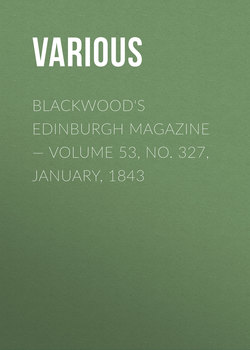Читать книгу Blackwood's Edinburgh Magazine — Volume 53, No. 327, January, 1843 - Various - Страница 8
LESURQUES; OR, THE VICTIM OF JUDICIAL ERROR VII.—THE PROOFS
ОглавлениеTwo years passed on without affording any clue to the conscientious magistrate. One day, however, he heard that a certain Durochat was arrested for a recent robbery, and was confined in the Sainte Pelagie; and remembering that Durochat was the name of the one designated by Couriol as having taken the place beside the courier, under the false name of Laborde. At the epoch of the trial of Lesurques, it came out that several persons, amongst them an inspector of the administration des postes, had seen the false Laborde at the moment that he was awaiting the mail, and had preserved a distinct recollection of his person.
M. Daubenton, on ascertaining the day of Durochat's approaching trial for robbery, went to the administration des postes, and obtained through the Chef the permission to send for the inspector who had seen the false Laborde, and who was no longer in Paris.
The juges du tribunal had also been warned of the suspicions which rested on Durochat. The day of trial arrived, and he was condemned to fourteen years' imprisonment, and was about being led from the court when the inspector arrived, and declared that Durochat was the man whom he had seen on the 8th Floréal mount beside the courier under the false name of Laborde. Durochat only opposed feeble denials to this declaration, and was consequently taken to the Conciergerie.
On the morrow, Durochat was transferred to Versailles, where he was to be judged. Daubenton and a huissier departed with the prisoner and four gendarmes. As they reached the village of Grosbois he demanded some breakfast, for he had eaten nothing since the preceding day. They stopped at the first auberge, and there Durochat manifested a desire to speak to the magistrate in private.
Daubenton ordered the gendarmes to leave them together, and even the huissier, though he made him understand by a sign the danger of being alone with so desperate a villain, was begged to retire. A breakfast was ordered for the two. It was brought—but, by order of the huissier, only one knife was placed on the table. Daubenton took it up, and began carelessly to break an egg with it.
Durochat looked at him fixedly for a moment, and said,
"Monsieur le juge, you are afraid?"
"Afraid!" replied he calmly, "and of whom?"
"Of me," said Durochat.
"Folly!" continued the other, breaking his egg.
"You are. You arm yourself with a knife," said he sarcastically.
"Bah!" replied Daubenton, presenting him the knife, "cut me a piece of bread, and tell me what you have to communicate to me respecting the murder of the courier of Lyons."
There is something in the collected courage of a brave man more impressive than any menace; and courage is a thing which acts upon all natures, however vile. Strongly moved by the calm audacity of the magistrate the ruffian, who had seized the knife with menacing vivacity, now set it down upon the table, and with a faltering voice said, "Vous êtes un brave, citoyen!" then after a pause, "I am a lost man—it's all up with me; but you shall know all."
He then detailed the circumstances of the crime, as we have related them above, and confirmed all Couriol's declarations, naming Couriol, Rossi, Vidal, and Dubosq, as his accomplices. Before the tribunal he repeated this account, adding, "that he had heard an individual named Lesurques had been condemned for the crime, but that he had neither seen him at the time of the deed, nor subsequently. He did not know him."
He added, that it was Dubosq whose spur had been broken, and was mended where they had dined; for he had heard them talk about it, and that he had lost it in the scuffle. He had seen the other spur in his hand, and heard him say that he intended throwing it in the river. He further gave a description of Dubosq's person, and added, that on that day he wore a flaxen peruke.
Towards the end of the year 8—four years after the murder of the courier of Lyons—Dubosq was arrested for robbery; and was transferred to Versailles, there to be judged by the Tribunal Correctionnel. The president ordered that he should wear a flaxen peruke, and be confronted with the witnesses from Mongeron and Lieursaint, who now unanimously declared that he was the man they had seen. This, coupled with the declarations of Couriol, Durochat, and Madelaine Breban, sufficed to prove the identity; and he did not deny his acquaintance with the other culprits. He was therefore condemned, and perished on the scaffold for the crime.
Vidal was also arrested and executed, though persisting in his innocence; and, finally, Rossi was shortly after discovered and condemned. He exhibited profound repentance, and demanded the succours of religion. To his confessor he left this declaration—"I assert that Lesurques is innocent; but this must only be made public six months after my death."
Thus ends this strange drama; thus were the proofs of Lesurques's innocence furnished beyond a shadow of doubt; and thus, we may add, were seven men executed for a crime committed by five men; two therefore were innocent—were victims of the law.
